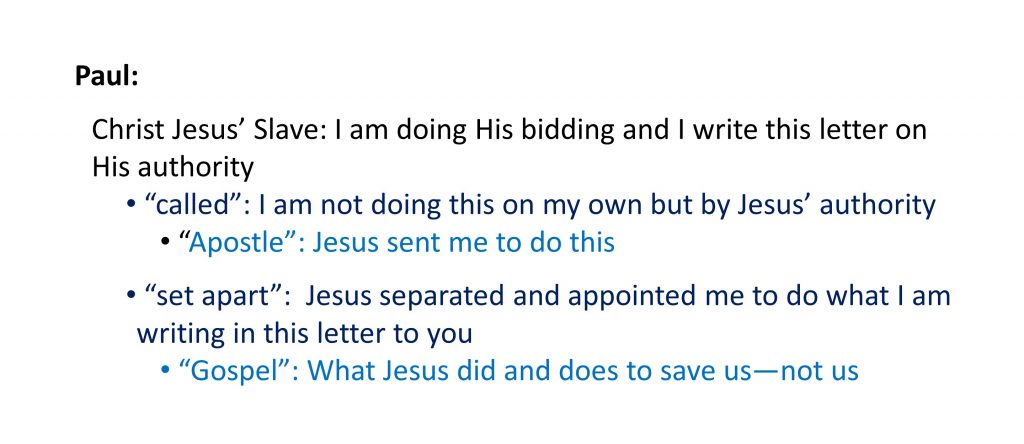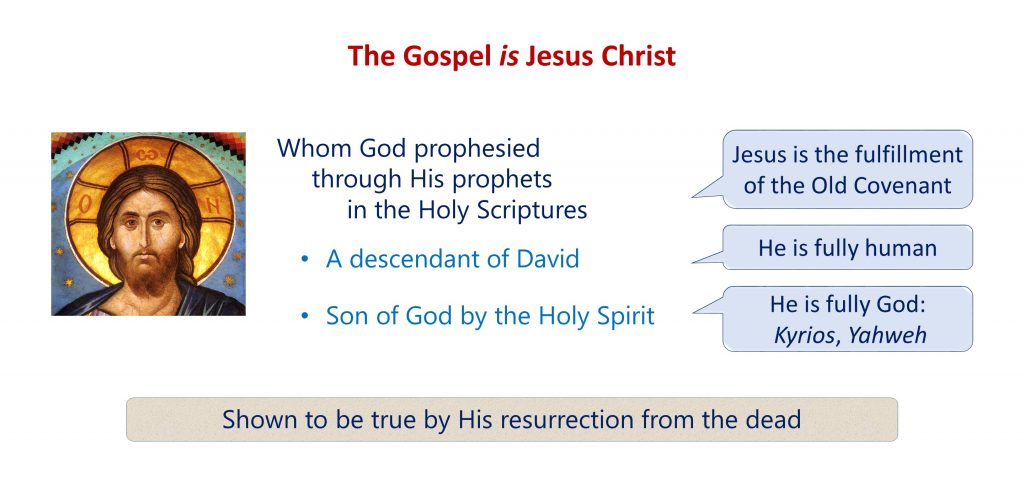As was the custom of letters in his day, Paul first identifies himself as the author. Next, the author would identify the recipient(s) and then greet them.
- 1 Maccabees 10:25: “King Demetrius to the nation of the Jews: Greetings.”
- Acts 15:23: “From the apostles and the elders, your brothers, to the brothers among the Gentiles in Antioch, Syria, and Cilicia: Greetings.”
- James 1:1: “James, a slave of God and of the Lord Jesus, the Messiah, to the 12 tribes in the Dispersion: Greetings.”
Paul doesn’t follow normal protocol. Instead, he does something jarring, breaking letter-writing convention to insert extra information for emphasis. In Romans, Paul inserts his longest statement between the stated writer and recipient, which reveals how challenging he saw the situation at Rome.
Read Romans 1:1
“servant”: Greek, doulos, slave. Paul is bought, paid for, and owned by Christ. In the Old Covenant, God also sent his “slaves” for His purposes.
- Psalm 105:26: “[God] sent Moses his slave [LXX, doulos], and Aaron, whom he had chosen.”
- Amos 3:7: “Indeed, the Lord God does nothing without revealing his counsel to his slaves [LXX, doulos], the prophets.”
- Zechariah 1:6: “Did not my words and my decrees, which I commanded my slaves [LXX, doulos], the prophets, overtake your ancestors? They repented and said: ‘The Lord of the Heavenly Armies has treated us according to our ways and deeds, just as he determined to do.’”
- How does Paul want the Jewish Christians in Rome to understand him being a slave of Jesus?
- If we were to understand “slave” in a positive light, what would Paul being a slave mean concerning the contents of his letter?
- How do the other verbs in this verse affirm what Paul does as a “slave”?
“Apostle”: literally, “sent one.” Jesus directly called and sent the Apostles to disciple by baptizing and teaching (Matthew 28:19-20), to watch over the Church (2 Corinthians 11:28), whom the Holy Spirit used as writers of the New Testament (2 Peter 3:2).
- Matthew’s Gospel with Christ’s commission was already written and disseminated widely.
- In the Septuagint, King Jehoshaphat sent (“apostled”) his princes, Levites, and priests to teach in all of the cities of Judah (2 Chronicles 17:7-9)
- For what purpose does Paul say he is “set apart”?
“Gospel”: Greek, euangelion, “good news.” In the Septuagint, the Gospel is the announcement of God’s saving intervention (Isaiah 40:9, 52:7, 60:6, and 61:1. See also Psalm 40:9, 96:2, and Nahum 1:15).
- Here, Paul says “the Gospel of [meaning from, not about] God”; earlier, “slave of Christ Jesus.” What is Paul beginning to do with Jesus as the fulfillment of the Old Covenant?
- Of the two main errors taking place at Rome (work righteousness by requiring adherence to Old-Covenant rituals, the Gospel frees us to sin), which does Paul first target?
The Content of the Gospel (1:2-4)
Paul now goes on to say what this “Gospel” is. Paul could have started a separate sentence but chooses not to do so. Paul uses a long sentence for emphasis: what follows is needed to understand what the Gospel from God is.
Read Romans 1:2-4
“which [God] promised”: Greek, ho, which can mean who/whom, what, or which. Here it means “whom.” Jesus is the Gospel of and from God.
“holy Scriptures”: Greek, hagiai graphai, “holy graphics [writings].” This is not an expression in the Septuagint but a Jewish expression, which Paul only uses here. This is “insider information” for the Jewish Christians that Paul is addressing them specifically.
“Jesus Christ our Lord”: “Lord” (Kyrios) was the Septuagint’s translation of Yahweh, God’s personal name. Jesus is God, the incarnation of Yahweh.
- If Jesus is the Gospel, whom God promised in the Holy Writings, what does that imply about the Old Covenant since Christ fulfilled those prophecies in His coming?
- What does Paul affirm about Jesus being “descended from David” and “the Son of God… according to the Spirit”?
- What does Jesus’ resurrection show (or prove)?
Read Romans 1:5-6
- Who are the “we”?
- Who are the “you”?
- Through the “we,” what are the “you” to receive?
“all the nations”: Greek, ethnos, Gentile. Paul’s bringing in of “Gentiles” counters the Jewish-Christian thinking that following Old-Covenant rituals are still needed for someone to be a “real” Christian. Gentiles can remain Gentiles without having first to become Jews to become “real” Christians.
Excursus: The Obedience of Faith
Based only on the Greek grammar, Paul could be saying:
- The obedience to faith that someone has.
- Believing in Christ is submission to Him.
- The obedience that faith works in someone.
- Faith brings about the obedience that God demands.
- The obedience that consists of faith.
- God calls us to trust in Him and obey, that is, follow Him.
The immediate context of the Christians in Rome lets us know the point Paul was making. Faith is trust in God, which results in following Him.
- Dealing with the Jewish mind: The obedience to faith that someone has. Paul does NOT mean this, that believing in Christ is submission to Him. That was the Jewish-Christian mindset. Obeying comes first, which then establishes one’s standing before God.
- The Gospel then is only an offer, dependent on what you first do. In Paul’s day, the Jewish Christian thought this was through following Old-Covenant rituals.
- Instead, faith is trust, which results in following Christ; following Him does not result in faith.
- Dealing with the Gentile mind: The obedience that faith works in someone. It’s true: faith does bring about obedience to Christ—but we still have a sinful nature, which gets in the way. The Gentiles did not recognize the full force of our sinful nature. Paul does NOT mean this, for he is also dealing with the Gentile error: The Gospel gives the Christian freedom to sin.
- Instead, faith is trust in God, which results in following Him, not in not following Him.
- The Christian mind: The obedience that consists of faith. God calls us to trust in Him and obey, that is, follow Him. This refutes both the Jewish-Christian error that obedience is required first; it also refutes the Gentile-Christian error that God’s grace frees us from obeying since that (as they thought) would nullify grace.
How do we know that Paul meant the obedience that consists of faith? Here’s why. Earlier in verse 5, Paul had just mentioned “grace,” which is something no can deserve by what he does. That countered the Jewish-Christian mindset. Paul also mentioned “obedience,” countering Gentile mind that being required to obey God nullified His grace.
But there’s more: part of Paul’s use of “obedience that consists of faith” was to focus on the Jewish Christian’s fixation on following Old-Covenant rituals. Through irony, by using “obedience,” Paul was saying this: Jewish Christians, if you are going to fixate on obedience, fixate on obeying the Gospel, not on obeying the Old-Covenant Law!
————-
Recipients of the Letter
Read Romans 1:6-7
- Based on context, who are the “all” whom God loves and whom Paul addresses?
- What does this mean for the Jewish and Gentile Christians?
“called to be holy”: A people set apart by being brought into a covenant with God to be “holy” as He is holy. For the Jewish Christian, this is Christ’s New Covenant, not the Old; for the Gentile Christian, this is the behavior that follows being brought into the New Covenant.
“peace”: In English, peace denotes a lack of conflict. The biblical meaning, however, denotes health and wholeness, even the final fulfillment of that peace in the resurrection on the Last Day, when “the God of peace will crush Satan under your feet” (Romans 16:20). Like grace, this is something from God, not self-generated.
Praise for the Roman Christians
Compared to the praise Paul lavished on other congregations, Paul’s praise for the Romans is minimal (Compare 1 Corinthians and 1 Thessalonians). Even the dysfunctional Corinthians received much more praise than the Romans. Yet, Paul still has words of praise.
Read Romans 1:8
- What does Paul praise the Roman Christians for?
- Why do you think Paul doesn’t praise their deeds?
“your faith is proclaimed”: “is proclaimed” is a present, passive verb: “is being proclaimed.” Paul praises the Romans for their “faith” being proclaimed even though they are not proclaiming it—it is “being proclaimed.” Although he is praising them, it is, by all accounts, faint praise.
Intention and Reason
Paul now begins a series of three statements of what he intends and why.
Read Romans 1:9-10
- How does Paul remember the Roman Christians?
- What would Paul like to happen between himself and the Church at Rome?
Read Romans 1:11-12
- What does Paul want to pass on to the Roman Christians?
- In the process of doing that, how will that benefit Paul?
- After mentioning “spiritual gift to strengthen you,” Paul mentions encouraging “each other’s faith.” Why would their faith need strengthening?
Click here to go to the next Lesson.




